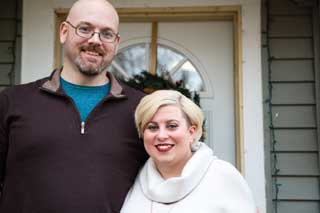The Word from Lansing: Another Failed Attack on Catholic Provider Underscores Importance of Religious Liberty

Posted January 31, 2022
In these days of increasing hostility toward religious organizations operating in the public square, it is important to recognize when religious liberty is upheld.
Take, for instance, last year when the City of Philadelphia cut off the local Catholic Social Services agency and its foster care program because the agency had not been certifying same-sex couples as foster parents due to Catholic teaching on marriage and family.
The Archdiocese of Philadelphia sued, and the entire U.S. Supreme Court — all nine justices, including those nominated by both Republicans and Democrats — agreed Philadelphia had violated the Catholic charity’s free exercise of religion.
That decision laid the foundation for another victory for religious liberty — as well as for children in foster care — right here in Michigan.
For more than 70 years, St. Vincent Catholic Charities in Lansing has helped place foster children with families as one of many private organizations that assists the state of Michigan in this crucial public service. And like some of these private organizations, St. Vincent’s work is driven by its adherence to the Catholic faith, not only in serving the most vulnerable, but in all that the Church teaches.
That includes the belief — grounded in faith and reason — that children do best in life when they grow up with a mom and dad who are married to each other. That in no way diminishes the sacrifice single parents carry out in raising children, nor does it diminish the dignity and worth of children who come from these families.
The state’s recognition of the important role faith-based providers play in pairing foster children with permanent families was given bipartisan endorsement by the Legislature with a bill signed into law in 2015 that protected the conscience rights of religious providers.
But opposing forces came in to undermine that bipartisan agreement. A lawsuit was filed against St. Vincent over its policy regarding same-sex couples, leading to a “settlement” between the suing party and a sympathetic state agency that created a policy allowing the state to not work with agencies like St. Vincent because of the agency’s religious beliefs on marriage and family.
It is important to note here St. Vincent serves a diverse array of clients through many social programs, including those who identify as LGBTQ, and that includes serving children regardless of race, religion, sex, or sexual orientation.
And while St. Vincent cannot endorse same-sex or unmarried couples, they can provide them with information on agencies who can, as reported recently. A same-sex couple can even adopt a child in St. Vincent's care if they have their home study completed by a different agency.
So the issue here isn’t about LGBTQ couples accessing adoption services but rather the religious liberty of Catholic providers to be allowed to operate according to their beliefs.
But the effect of such a policy was clear: St. Vincent must either change its beliefs, violate its conscience, or shut down, taking itself out of the crucial work of placing children with adoptive families.
That last option would have detrimental impacts beyond the wellbeing of St. Vincent, as the charity’s work in the area of child placement is quite prolific: In 2017 Saint Vincent recruited more adoptive families than nearly 90% of the other agencies in its service area.
Also, Catholic Charities like St. Vincent are particularly effective at finding homes for children with special needs and sibling groups. According to one study, 45% of Catholic Charities adoptions were of children with special needs. St. Vincent recruits homes for children with disabilities at nearly double the average rate across the state.
Like in Philadelphia, it took a lawsuit — this time, from a family with five special needs children adopted through St. Vincent — to win back the charity’s right to serve according to its Catholic beliefs.
Three years after filing suit, the plaintiff Buck family — represented by the Becket religious liberty law firm — and St. Vincent reached a settlement with the state announced this week, which was more of a victory for religious liberty and a rebuke of those who try to force religious providers to keep their beliefs to themselves.
Under the agreement, the state cannot take action against St. Vincent — or terminate or refuse to renew its contract with St. Vincent — if the agency doesn’t certify or approve a same-sex or unmarried couple as a foster parent or adoptive parent, conduct a home evaluation for a same-sex or unmarried couple, or place a foster child with a same-sex or unmarried couple for foster care or adoption.
The settlement terms are significant given the fact that if the state had gotten its way, St. Vincent and other Catholic charities would be out of the picture when it comes to helping foster children find families. And with more than 13,000 Michigan children in the foster care system and more than 600 Michigan children aging out of the system each year — leaving them without family, resources, or support — placing foster children in families is an all hands-on deck situation where more agencies mean more potential families and more kids placed in loving homes.
Michigan Catholic Conference joins in the Diocese of Lansing in saying that this week’s settlement of the St. Vincent case is an important win for religious liberty and also for the most vulnerable children in the State of Michigan.
As we said in our statement this week, we believe the settlement upholds the constitutional right to religious liberty that is a cornerstone of our state and nation.
It is worth celebrating the preservation of religious liberty and the good that will come from the continued operation of Catholic service providers.
But this was not the first time religious liberty has been tested, and it certainly will not be the last.
